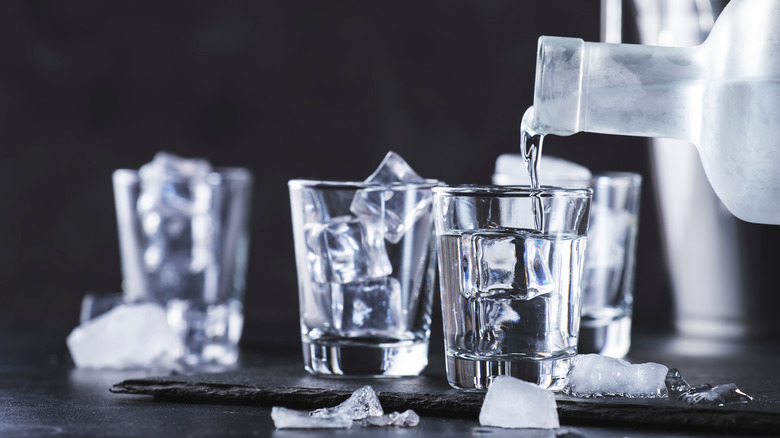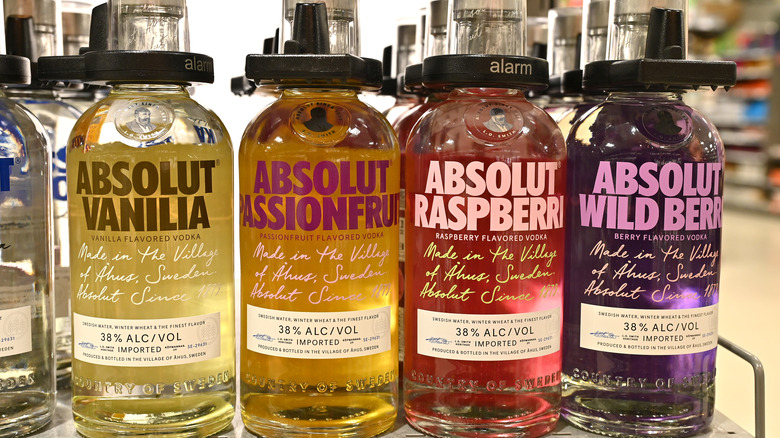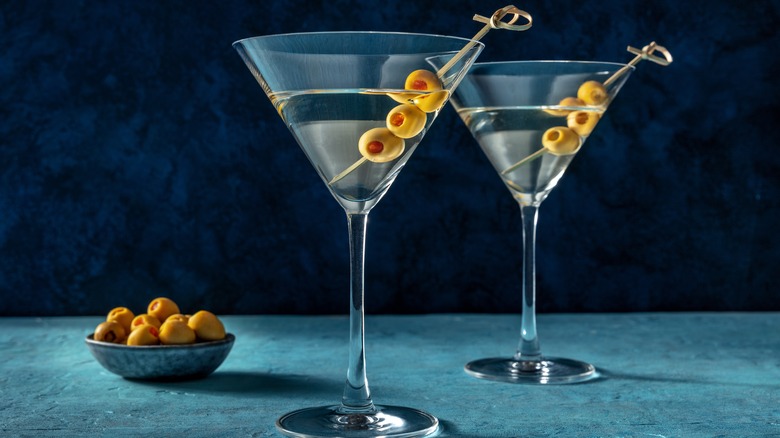How Long You Have To Drink An Open Vodka Bottle For The Best Flavor
Before you open a bottle of vodka (or any distilled liquor, for that matter), its shelf life is indefinite. But once the bottle has been opened, a deterioration in flavor is inevitable.
For most distilled liquors, that off-taste will typically begin to appear in as little as one year, or as many as three years after the bottle has been opened. Of course, this decay in flavor is unlikely ever to become a reality for most people. The standard-size bottle of vodka in the U.S. is traditionally 750 milliliters, or a little over 25 ounces. A typical recipe for a cocktail like a vodka and tonic calls for two ounces of vodka. So if you pour only one of these drinks per day, the bottle will still be finished in less than two weeks.
But even if you're a light drinker and seldom throw parties, the odds of your vodka going bad after opening are still pretty slim. That's because vodka has one of the longest shelf lives of any distilled liquor and should be able to resist the effects of oxidation for 10 to 20 years, even after it has been opened. If it's unflavored, that is. Flavored vodka is prone to more rapid decay.
Flavored vodka has a shorter shelf life than unflavored vodka
Vodka is one of the most popular distilled liquors in the U.S., according to the Distilled Spirits Council of the United States, with sales accounting for upwards of six billion dollars in a single recent year (2019). A significant percentage of those overall sales were attributed to flavored vodkas (21% of total sales), which as noted, have a much shorter shelf life than the unflavored alternative.
Bacteria and mold are incapable of living in vodka due to its relatively high alcohol content (most vodkas are approximately 40% alcohol by volume, or about 80 proof), and in unflavored bottles, oxidation — a degradative process caused by oxygen exposure that can affect everything from food and wine to human beings and precious metals (aka rust) — occurs very, very slowly over the course of a decade or more. In flavored vodkas, however, the oxidative process is sped up significantly, due to the presence of added ingredients. As a consequence, flavored vodkas have a shelf life after opening that's much shorter: three months to two years, on average.
The effects of oxidation may happen at different rates in flavored versus unflavored vodkas, but the results are the same. Over time, the presence of air in the bottle will sap both flavor and potency (meaning, reduce the alcohol content). As all liquor actually does expire, so too does vodka.
Tips for storing vodka
What can you do to stave off the inevitable? For starters, after you've made your vodka salty dog cocktail, keep your bottles away from sunlight. This type of exposure is bad for all liquors, including vodka, as it speeds up oxidation. Cool and dry are the operative words when choosing where to store your vodka. Room temperature is preferred. Yes, freezer storage is an option — the vodka won't freeze either unless it's exposed to temperatures below -9 degrees Fahrenheit – but refrigeration or freezing is not necessary, and it doesn't enhance the liquor's flavors. On the contrary, freezing masks flavors.
It's also important, of course, to keep the bottle sealed tightly with its cap whenever it's not in use. Just because you've opened the bottle, in other words, that doesn't mean you should leave it open. Any time the bottle's contents are exposed to air, oxidation is accelerated. The decanter, sometimes recommended as a method to make your prized whiskey last longer, doesn't actually prevent oxidation.
If you've purchased a flavored vodka, understand that your window to enjoy it is limited, regardless of storage conditions. Grey Goose, for example — a notable French vodka brand — recommends consuming flavored vodkas within three months of opening the bottle. With the unflavored variety, meanwhile, you have up to 20 years before you need to rush things. That's if you've opened the bottle. If not, you may have up to 50 years to enjoy ideal drinking conditions.



